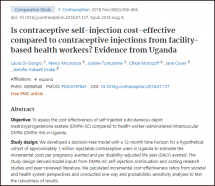Is Contraceptive Self-injection Cost-effective Compared to Contraceptive Injections from Facility-Based health Workers? Evidence from Uganda
A study was performed to assess the cost-effectiveness of self-injected subcutaneous depot medroxyprogesterone acetate (DMPA-SC) compared to health-worker-administered intramuscular DMPA (DMPA-IM) in Uganda.
The conlcusion of the study was that under a societal perspective, self-injected DMPA-SC averted more pregnancies and cost less compared to health-worker-administered DMPA-IM. Under a health system perspective, self-injected DMPA-SC can be cost-effective relative to DMPA-IM when a lower-cost visual aid for client training is used.
Source: Contraception
Date of Publication: September 20, 2020
SIMILIAR RESOURCES
Tools
Examples
- Self-Care: A Cost Effective Solution for Maternal, Newborn & Child Health for All
- WHO Consolidated Guideline on Self-care Interventions for Health: Sexual and Reproductive Health and Rights
- Who Self-Cares Wins
- Self-Care: Better Daily Health for Individuals and Societies
- Advocacy Roadmap - Igniting a Self-Care Movement for Sexual and Reproductive Health
- Self-Care Quality of Care Framework
- Acceleration of Self-Care in the Time of COVID-19
- Home-Based Care Reference Guide for COVID-19
- Going Online to Accelerate the Impact of HIV Programs
- Documenting the Costs of Social Behavior Change Interventions for Health in Low- and Middle-income Countries
- Costs and Cost-effectiveness of Subcutaneous DMPA through Different Delivery Channels: What the Evidence Tells Us
- Self-Care in Sexual and Reproductive Health and Rights: A New Frontier in Healthcare
- 7 Acts of Self-care You Can Practice during a Winter Lockdown
- Investing in Social and Behavior Change is Cost-effective for Improving Malaria Behaviors in Côte d’Ivoire
- Investing in Social and Behavior Change is Cost-effective for Improving Malaria Behaviors in Tanzania

